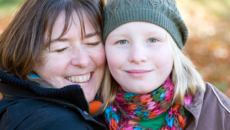I was in a local bookstore browsing the latest parenting guides — anxious mom that I am — when I spotted The Parents We Mean to Be. I’d never heard of the book or its author, Richard Weissbourd. But within moments, he had me hooked.
In his book, Weissbourd warns that children’s moral development can be undermined by even the most loving parents. While we want our children to develop empathy, we often demonstrate just the opposite, he argues. We overprotect them, emphasizing self-esteem over the need to care for others.
These insights seem especially relevant to adoptive families. We love being close to our children, and we’re committed to the social idealism that Weissbourd applauds. Yet we’re often guilty of overindulging our kids, trying to make up for their early losses.
I became so intrigued by the connection between moral development and adoption that I interviewed Weissbourd, a child and family psychologist at Harvard University’s Graduate School of Education. Through our conversations, some key themes emerged for our families. He shared ways we can help our children develop empathy — and in the process, stop worrying so much about our kids.
Be a Moral Model
In the most basic ways, parents demonstrate caregiving to their children by feeding them, hugging them, and nursing them when they’re ill. But beyond that, we sometimes fall short. “As a culture, we’re out of whack,” Weissbourd says. “We focus too much on our kids’ happiness and not on their responsibility to other people.”
Maybe we should reexamine our values — promoting compassion over getting into Harvard, even if every parent around you is in a tizzy about their kids doing their “personal best.” Alex Speredelozzi, of Providence, Rhode Island, says his six-year-old daughter, Lily, a Chinese adoptee, sometimes accompanies his wife, Carmen, on her rounds as a nurse and geriatric care manager. Although her exposure to caregiving was mostly unintentional on their part, he notes, it’s had good consequences. “Lily talks about wanting to be a nurse,” Speredelozzi says.
You don’t have to be a professional caregiver to foster moral development. Being a moral model is about our everyday choices and behaviors. Children notice how adults behave with others. They watch when we care for elderly parents. When we cut off drivers in traffic, they see that, too. Everyday family interactions are the testing ground.
Do we take turns talking at the dinner table, for example? Interrupting another person may not seem like a moral issue, but turn-taking shows kids that they aren’t the center of the universe. My husband and I have to strike a balance between encouraging our delightful, chatterbox son and getting him to pay attention to others. We take turns talking, and we allow Nick to have the floor if he doesn’t talk over us.
Teach Kids to Question
Learning respect for others isn’t just about enforcing a set of behavior rules. Respect is a way of thinking. Self-reflection and “perspective-taking,” in Weissbourd’s words, are crucial for developing empathy.
The trouble is, our culture encourages achievement over introspection. “A lot of white middle- and upper-class kids are not reflective,” Weissbourd says. Many of them are cocooned by material comfort and overprotective parents. The Comfortable Kids don’t see life through anybody else’s eyes.
Many adoptive parents say their children are more empathic than their peers, and Weissbourd’s work with at-risk youth (he’s also the author of The Vulnerable Child) offers some clues as to why that might be so. Even well-off white adoptees sometimes develop a way of being with other people — of studying the Comfortable Kids, of wondering where they fit in — that has more in common with the thinking of minority children and immigrants.
Awareness of others is a strength. It exposes adoptees to racial and economic differences. Yet it can be painful for them, as it is for anyone who feels like an outsider. The challenge for adoptive parents is to accept their children’s discomfort.
Supporting the self-reflection that many adoptees come by naturally is vital. Barbara Yates, of Roseville, Minnesota, discusses charitable giving with her 10-year-old daughter, Cammy, a Guatemalan adoptee. “I try to engage her in the decision — ‘Do you think this is a good thing for our family to do?'” Yates says. “We list the reasons we want to do it and why we may not want to. Sometimes she will request that we make a contribution to an organization, and we go through the same process.”
Most experts say kids don’t become reflective in this way until they’re about 10 years old. Yet Peter Sommer, head of Cambridge Friends School, where my son is a student, believes parents and teachers can encourage this process much earlier. At this Quaker school, for example, pre-k and kindergarten students learn about “people of inspiration,” like Martin Luther King, and are asked to reflect on what honesty and equality meant to them. In most schools, this happens in higher grades.
Sommer, the adoptive parent of a 20-year-old daughter, notes the power of adoption stories in promoting reflection. He remembers cradling his daughter, a domestic adoptee, at six months, telling her the classic line: We wanted very much to have a child, and your birth mother wanted to have a good home for her child. His daughter internalized this story, Sommer says, asking questions once she could talk. He believes that adoptees develop a sense of “the other” long before their peers do. When the facts of an adoption are handled honestly, a child learns that “there’s this other person [a birth parent] who’s part of her story,” he says.
At our house, we have an “oops jar.” Anyone in the family who uses an insulting word, like “jerk,” has to put in five cents. We donate the proceeds to a good cause. Soon after we started the “oops rules,” our first-grader was no longer losing his pennies. But the adults still do. “Mom, you said an ‘oops’ word!” he loves to shout. The point of the penny-tossing is to discuss why some words hurt other people — and why that matters.
Don’t Overworry
There are plenty of micromanaging parents, but the emphasis on success can stress out adoptees more than their non-adopted peers. We love our “wonder kids” intensely. We don’t want them to fail, ever. We insist that teachers and coaches pay attention to our child. We overcompensate.
Some adoptees think they have to be perfect, says social worker Deb Shrier, a post-adoption counselor at Wide Horizons for Children, in Waltham, Massachusetts. “And parents feel they need to be the perfect parent, parenting the perfect child.”
But worrying too much about our wonder kids is counterproductive. For Shrier, Weissbourd, and other clinicians, the trouble comes when parents confuse their own feelings with those of their children. Who feels like a failure because a child can’t make friends? If it’s you, the parent, leaping in to “help” your child in an altercation with another kid sends the wrong message — that maybe there is something to be ashamed of.
Be a Parent, Not a Therapist
The closeness we feel with our children is a gift, but it carries emotional risks. Many of us push our kids to talk about their feelings. We try to explain their every mood to them. Think of all those earnest moms on the playground, wading into sandbox fights. Jimmy, you don’t want to take that shovel from Evan, do you? It’s OK, Evan, Jimmy isn’t being mean to you.
Weissbourd draws a line between healthy self-reflection and psychobabble, especially when young children are asked to process feelings before they’re able. They need us to be parents, he emphasizes, not therapists.
In practice, this is another balancing act. Weissbourd describes a typical situation with his own son, who might say: “My teacher is driving me crazy, it’s three hours of homework, three nights in a row.” Weissbourd’s wife might jump in: “Well, maybe the teacher was feeling this way….” But Weissbourd says that what his son wants first is empathy: “Well, that stinks!”
“They want to see us as having strong biases and loyalties and allegiances and flaws, not as neutral observers,” he says.
This is a particular pitfall for adoptive parents. The adoption community is full of therapeutic talk about attachment and bonding. But if we play therapist with adoptees, he suggests, there’s a risk. We may reinforce a child’s sense that we aren’t her real parents. When we act like all-knowing observers, Weissbourd says, “Kids feel like we’ve evaporated.”
The most meaningful conversations with my son usually happen in the car, when I least expect them. Recently, while I was driving Nick, who is a Vietnamese adoptee, to summer camp, he asked how kids get into orphanages. “Who brings them there? What happens to them?” Thus began a discussion of why people are poor in developing countries, with me following Nick’s lead.
During my interviews with Weissbourd, I mentioned our car debates, which happen when Nick is in the back seat and doesn’t have to meet my eyes. Weisbourd nodded wryly.
“They can’t handle the intensity,” he says. Then he adds, “How do you talk to your kid about this complex information? We’re the first generation of parents I know of that really wants to talk to kids about their feelings. It’s not like we have a lot of models or maps for doing this. But we have to talk, to get feedback, to be in tune with our kids about what’s working and not working.”
Here’s where the adoption community has an edge. In our online networks, conferences, and newsletters, we admit mistakes. We take advice from other parents and adoptees. And when we’re most humane, we tell each other to lighten up.

